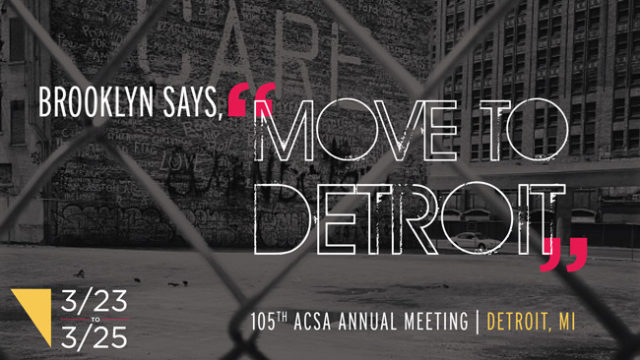Carla Leitao at ACSA / Detroit (Sat 03/27)
Faculty News:
CARLA LEITAO TO CHAIR PANEL AT ACSA MEETING.
On Saturday March 27th, 3:30pm at the ACSA 105th Annual Meeting in Detroit, Lecturer Carla Leitao and partner Ed Keller will chair the “Addressability” panel / topic.
For more information about the ACSA Meeting, please click these links > Information – Schedule – Topics
Addressability
Topic Chairs: Carla Leitao, Rensselaer Polytechnic Institute
Ed Keller, Parsons The New School for Design
In the design of today’s ‘smart cities’, we increasingly see scenarios of pervasive information collection and datamining deployed across diverse population demographics, further embedding a set of relations of power, asymmetry and inequality in the name of a ‘parametrized efficiency’. The role of cultural production in the nurturing and maintenance of thriving urban centers is disassembled and ‘optimized’ through ideas of urbanity that can be seen as encapsulated into new forms of architecture or expanded/exploded into new forms of technologically based micro-cultures, deployed as ecosystems/assemblies instantaneously across the network. As a case study, Vernor Vinge’s “Rainbows End” explores the consequences of this developing techno-scape: set in a near future balancing between biotech misuse, emerging forms of crowdsourcing, immersive VR, total surveillance and security, and ubicomp/AI.
In the last 10-20 years we have seen discourses around these ‘smart city’ concepts emerge, develop and implode into ‘post-smart’ city dimensions of inquiry, critique, and resistance. Intrinsic to these investigations is the questioning of processes by which information is connected to and helps define aspects of spaces, objects, forms, and human exchanges.
Throughout his work, Adam Greenfield has alerted us to visible and invisible models of technological surveillance and the more or less insidious ways in which they establish different characters of urbanity. Moreover, in Against the Smart City, Greenfield proposes alternatives to the lure of the pervasive reading/mapping processes of centralizing smart-cities, by refocusing on meaningful processes of cultural exchange that create thriving aspects of urban existence.
From another perspective, in The Stack, Benjamin Bratton recalls and characterizes the new formats of the overlapping ‘cyberlayer’ – smart grids, cloud platforms, mobile apps, ubiquitous sensing, the Internet of Things, automation – that now underlie all landscapes, and which catalyze a new series of questions around political economies and government. Bratton’s work radically questions foundational human principles for organizing the city, seeing both a truly new post-human produced by the ‘stack’, and imagining a collision between these new ontologies and emergent forms of governance.
Through the lens of the concept of addressability, we propose to reflect on and discuss the ways in which different modes of information collection, data mining, and knowledge production define a plethora of architectural and urban alternative platforms for interconnecting individuals, populations and cultural forms.
While addressability is a term used in computer science and information technology, we propose it as a condition of belonging, transparency and history by which exchanges – cultural, informational, social, political – create new geologies for urban existence, and myriad possibilities for individual and collective agency.
By focusing on the procedural aspects of these processes, the objective is to reveal avenues for potential new definitions and/or characterizations of cities or urban existence; which are otherwise invisible or suppressed in existing models or materialities. We suggest that an anticipatory and predictive urban forensics, or ‘dissection’ of these new substantive forms of addressability might propitiate and host generative processes in the design of a more politically responsive ’smart city’.
//
